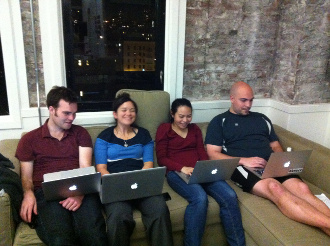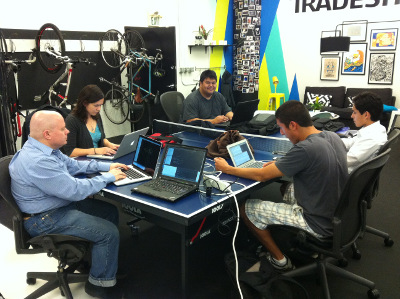Meetup 101: What makes a meetup successful
Tweet
rss
What is a meetup?
I grew up in Podunkville, North Carolina. NC is beautiful, but growing up in Podunkville means that I wasn't very good at computers and stuff. Sort of like your grand-parents. When I moved to the West Coast in 2011 (to lush Portland, Oregon), that all changed.
I was a lonely, single guy (well, I still am), and found this thing called meetup.com.
Meetups are cool. Someone forms a group, say “Single Moms Who Run” or “Dr. Who Geek Club,” posts an event shown to members who have joined that group.
You get over your shyness of meeting bunch of strangers in a new city, you show up, you have fun, and you fall in love with meetups.
Single Moms Who Run?
Okay, so I did't join that group - though I’m sure it's a cool group. But, in Portland, I made lots of friends through the Foodies! group. Kevin (the organizer) and I became good friends, and the group gave me access to lots of cool things in Portland, including meeting and having a major crush on a beautiful Chef named Courtney, who does awesome things through din din. (She was not single, so I still am.)
Fast forward to San Francisco. I wanted to learn to code, and started doing so on my own, but soon ran out of juice. You have to learn on your own, but sometimes you want the community that has your back. So, I looked to the meetups again and found SF Ruby group and SF JavaScript group.
From Participant to Organizer
Soon, I realized that there were many others in my shoes - beginners trying to break in, looking for help in their development and growth. I learned that I could add immediate value simply by organizing events where learners could come together, help each other, and even find mentors.
Thus was born the RubyRookies. There is little to look at online, because it was on-the-ground gathering of people. We met almost weekly around different set of topics for several months, especially in the first half of 2013. Lots of fun. Lots of friends. Lots of value to real people. All free.
What makes them successful?
Let me get down to what I learned about organizing successful meetups so you can host your own.
Rule #1. Have fun. It should be self-evident that you should do what you enjoy. Don't fret over a topic, theme, name, whatever. Just do something you enjoy. Sometimes others will join you, sometimes they won't. That's okay. It's your life. Thing is, you are more likely to attract others to what you are doing when you are enthusiastic about what you are doing. In other words, have fun!. If you are not having fun, no one else will. And whatever success you might pull off won't be sustainable.
Evening coding meetup
Rule #2. Focus on the people. People who come to your meetup are your people - you should care about them and take care of them. Think about communities you already encounter in your activities. For example, if you enjoy eating out, you likely have a group of people you go out with. You already have a good idea of what they care about, and how you can add more value.
For example, with RubyRookies, I learned very quickly that we all care about learning, having support, and the feeling that we were not alone in the journey. For example, people talk about pair programming quite fondly, like it's something sacred. And that tells you something as an organizer. You are getting into people's heads - not to take advantage, but to help them. I know, this sounds bit patronizing.
Rule #3. Cultivate Partners. When the firs RubyRookies met, it was at a SF cafe. Truth is, resources help. Most of the time, companies sponsor meetups with food and space. But, if you are just a Joe Schmoe or Jane Doe, then you got to get creative. Try some sales call to company community managers. Some Hacks - think about how to add value to the host. If you want to meet as runners, that's easy - just meet in front of a running store and go run. If you want to learn or teach Python, think about the local companies that use Python. Or think about a local coding bootcamp that teaches Python. It is a win-win for everyone. You will become quite adapt at negotiating and sales through this process.
Are these jokers coding on a ping pong table?
Rule #4. Branding. Consistency and branding, as you can imagine, helps. It helps because the awareness of what you are doing grows over time. Take it from the pros, and schedule something monthly or semi-regularly under a consistent name or series of related themes.
Rule #5. Content is King. As is the case in online marketing, content is king. Yes it should be things you find interesting, but investing time in crafting interesting content, or using interesting content will draw attention.
Notice how I did not have a rule about free food or free beer. Yes, it is definitely a big plus to have free beer flowing, but that's not what a meetup community is about. If you have a good core group of people who are having fun around what you are doing, the rest is just icing.
More to come
You will still have questions about how to reach members, how to advertise, and other growth hacks, and those will come in future posts. By the way, I also organize an awesome product management meetup called Product Management Fast Track and would love to see you at a future event. I also look forward to sharing real lessons learned from this experience in future.
You will also enjoy
This is a first post in a series about meetups and how you can use them for personal or community growth. Stay tuned during March, as we also hit topics like:
- How do you grow the membership?
- How much time does it take?
- Can you make money with a meetup group?
- Interviews with successful organizers
Subscribe and get useful info like this in your inbox:
comments powered by Disqus
Get new posts via email:
Read recent posts
- Guides to help you think like a hacker even if you don't program
- Mapping Your Career
- Does your company Quora?
- Mobile product teardown TripIt vs TripCase
- Hotel Tonight teardown: trigger and room analysis

